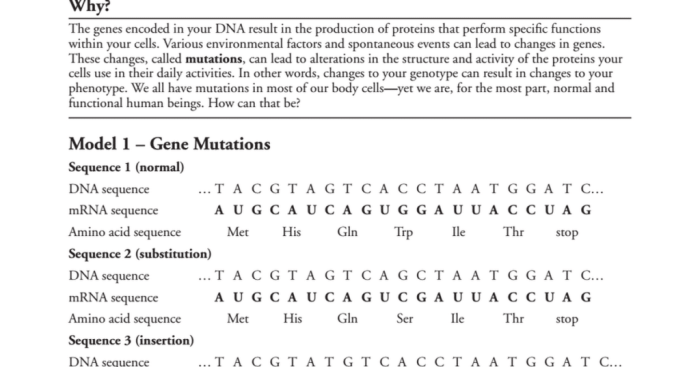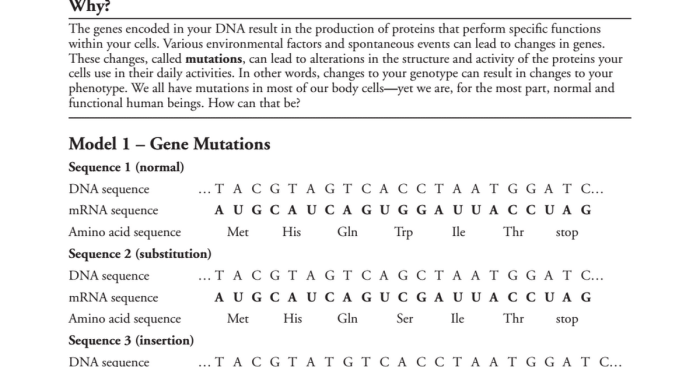Beginning with the pogil genetic mutation answer key pdf, this narrative embarks on a captivating journey, delving into the intricate world of DNA and its enigmatic mutations. As we unravel the complexities of genetic alterations, we uncover their profound impact on individuals, populations, and the evolutionary landscape.
Within the realm of medicine and research, genetic mutation analysis emerges as a transformative tool, offering unparalleled insights into disease mechanisms and therapeutic interventions. Yet, amidst these advancements, ethical considerations loom large, necessitating informed consent and vigilance against potential discrimination.
1. Definition of Genetic Mutation
A genetic mutation is a permanent change in the DNA sequence of an organism. Mutations can be caused by a variety of factors, including exposure to radiation, chemicals, and errors during DNA replication. Mutations can be either harmful, beneficial, or neutral.
Harmful mutations can lead to genetic disorders, while beneficial mutations can provide an organism with a competitive advantage.
Types of Genetic Mutations
There are many different types of genetic mutations. Some of the most common types include:
- Single-nucleotide substitutions: These are mutations that involve the replacement of a single nucleotide with another nucleotide.
- Insertions: These are mutations that involve the insertion of one or more nucleotides into a DNA sequence.
- Deletions: These are mutations that involve the deletion of one or more nucleotides from a DNA sequence.
- Duplications: These are mutations that involve the duplication of a portion of a DNA sequence.
- Inversions: These are mutations that involve the reversal of the orientation of a portion of a DNA sequence.
- Translocations: These are mutations that involve the movement of a portion of a DNA sequence from one chromosome to another.
Causes of Genetic Mutations
Genetic mutations can be caused by a variety of factors, including:
- Radiation: Exposure to radiation can damage DNA, leading to mutations.
- Chemicals: Exposure to certain chemicals can also damage DNA, leading to mutations.
- Errors during DNA replication: Errors during DNA replication can lead to mutations.
2. Importance of Studying Genetic Mutations
The study of genetic mutations is important for a number of reasons. First, mutations can provide insights into the causes of genetic disorders. By understanding how mutations occur, scientists can develop new ways to prevent and treat these disorders.
Second, mutations can help us to understand how evolution occurs. Mutations are the raw material for evolution, and they can provide insights into how new species arise.
Finally, the study of genetic mutations can have important implications for medicine. For example, mutations can be used to develop new diagnostic tests and treatments for genetic disorders.
Impact of Genetic Mutations on Individuals and Populations
Genetic mutations can have a variety of impacts on individuals and populations. Some mutations can be harmful, leading to genetic disorders. Other mutations can be beneficial, providing individuals with a competitive advantage. Still other mutations can be neutral, having no effect on the individual or population.
The impact of a mutation on an individual will depend on a number of factors, including the type of mutation, the location of the mutation, and the genetic background of the individual.
Role of Genetic Mutations in Evolution
Genetic mutations play a key role in evolution. Mutations are the source of new genetic variation, which is the raw material for natural selection. Natural selection favors mutations that provide individuals with a competitive advantage. Over time, these mutations can lead to the evolution of new species.
3. Applications of Genetic Mutation Analysis

Genetic mutation analysis is a powerful tool that can be used to diagnose genetic disorders, study the evolution of species, and develop new medical treatments.
Examples of How Genetic Mutation Analysis Is Used in Medicine
Genetic mutation analysis is used in medicine to diagnose a wide range of genetic disorders, including:
- Cystic fibrosis
- Sickle cell anemia
- Huntington’s disease
- Cancer
Genetic mutation analysis can also be used to develop new medical treatments. For example, genetic mutation analysis has been used to develop new drugs for cancer and other genetic disorders.
Examples of How Genetic Mutation Analysis Is Used in Research, Pogil genetic mutation answer key pdf
Genetic mutation analysis is used in research to study the evolution of species. By comparing the genetic mutations of different species, scientists can learn about how these species evolved from a common ancestor.
Genetic mutation analysis is also used in research to develop new medical treatments. For example, genetic mutation analysis has been used to develop new drugs for cancer and other genetic disorders.
Potential Benefits and Limitations of Genetic Mutation Analysis
Genetic mutation analysis has a number of potential benefits, including:
- Improved diagnosis of genetic disorders
- Development of new medical treatments
- Increased understanding of the evolution of species
However, genetic mutation analysis also has some limitations, including:
- It can be expensive
- It can be time-consuming
- It is not always accurate
4. Ethical Considerations in Genetic Mutation Analysis: Pogil Genetic Mutation Answer Key Pdf

The use of genetic mutation analysis raises a number of ethical concerns. These concerns include:
- Informed consent: Individuals should be fully informed about the risks and benefits of genetic mutation analysis before they consent to the test.
- Privacy: Genetic information is personal and sensitive. It should be kept confidential and only used for the purposes that the individual has consented to.
- Discrimination: Genetic information could be used to discriminate against individuals. For example, individuals with a genetic predisposition to a certain disease could be denied health insurance or employment.
It is important to weigh the potential benefits of genetic mutation analysis against the ethical concerns before using the test.
Importance of Informed Consent
Informed consent is essential in genetic mutation analysis. Individuals should be fully informed about the risks and benefits of the test before they consent to it. This information should include:
- The purpose of the test
- The risks and benefits of the test
- The possible implications of the test results
Individuals should also be given the opportunity to ask questions and discuss their concerns with a healthcare professional before they consent to the test.
Potential for Discrimination Based on Genetic Information
Genetic information could be used to discriminate against individuals. For example, individuals with a genetic predisposition to a certain disease could be denied health insurance or employment. It is important to protect individuals from discrimination based on their genetic information.
There are a number of laws in place to protect individuals from discrimination based on their genetic information. However, these laws are not always effective. It is important to be aware of the potential for discrimination and to take steps to protect yourself.
Key Questions Answered
What is a genetic mutation?
A genetic mutation is a permanent alteration in the DNA sequence of an organism, resulting in a change in the genetic material.
What are the different types of genetic mutations?
Genetic mutations can be classified into several types, including point mutations, insertions, deletions, and inversions.
What causes genetic mutations?
Genetic mutations can be caused by various factors, including exposure to environmental toxins, errors during DNA replication, and viral infections.